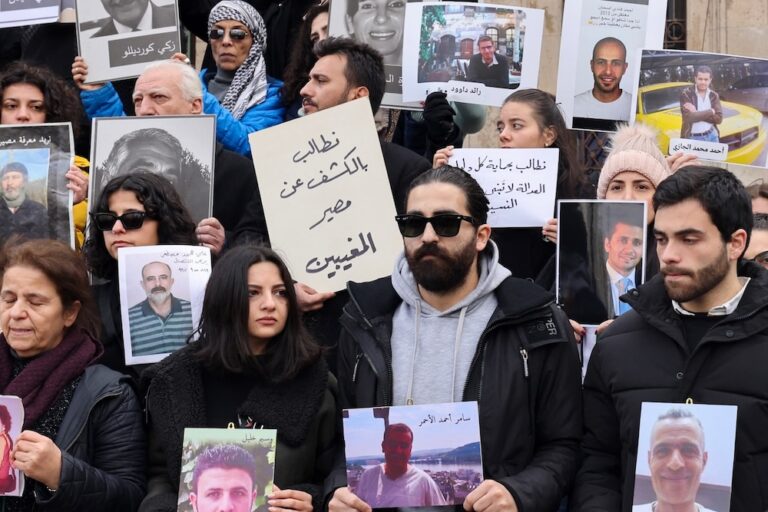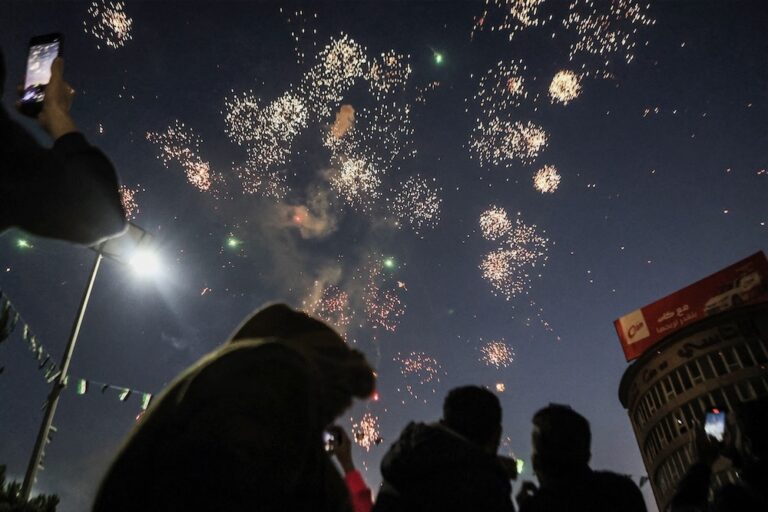Security forces have detained journalists and online activists who have reported on the protests or called for further protests.
(Human Rights Watch/IFEX) – London, March 25, 2011 – Syria’s security forces should immediately stop using live ammunition against protesters in the southern town of Daraa, where the death toll has risen considerably in the last 48 hours, Human Rights Watch said today. The government should also immediately release all those detained for protesting peacefully or expressing their opinions.
A Syrian human rights group has released a list of 36 dead in Daraa and its surrounding areas since protests began on March 18, 2011, while an official in the main Daraa hospital told Reuters on March 24 that the hospital had received the bodies of at least 37 protesters.
“Syria’s security forces are showing the same cruel disregard for protesters’ lives as their counterparts in Libya, Tunisia, Egypt, Yemen, and Bahrain,” said Sarah Leah Whitson, Middle East and North Africa director at Human Rights Watch. “President Bashar al-Asad’s talk about reforms doesn’t mean anything when his security forces are mowing down people who want to talk about them.”
At around 1:30 a.m. on March 23, Syrian security forces using teargas canisters and live bullets stormed the al-Omari mosque in Daraa, where protesters had gathered since March 18, two Daraa residents told Human Rights Watch. One resident, who was about 25 meters from the mosque at the time, said he saw corpses on the street. The phone conversation was interrupted by repeated gunfire.
A Syrian activist who has been closely monitoring the situation and speaking to Daraa residents by phone told Human Rights Watch, “It sounded like a war zone on the other end. I am really worried about a massacre.”
Two Syrian human rights activists said that seven protesters were killed that night, including a child, Ibtisam al-Musalema.
Syria’s state news agency, SANA, reported on March 24 that the security forces had attacked the mosque after an “armed gang” attacked an ambulance early on March 23 in the mosque’s vicinity, killing “a doctor, a paramedic, and a driver.”
Syrian TV broadcast pictures showing weapons, ammunition, and large amounts of money that the government alleged the armed gang stockpiled inside the mosque, but presented no evidence linking the materials to the alleged arm gang.
There are no other reports suggesting the protesters were armed or attacked the ambulance. The two Daraa residents who spoke to Human Rights Watch the night of the attack denied categorically that any of the protesters had opened fire or possessed any weapons.
Security forces opened fire on protesters again later on March 23, a Syrian human rights activist and a Daraa resident told Human Rights Watch. YouTube videos released later that day showed at least four corpses lying on a street and protesters trying to pull them away, as heavy and continued gunfire is heard in the background. A Daraa resident who saw the films confirmed to Human Rights Watch that the scenes were from Daraa.
Syrian human rights groups said that the security forces also opened fire on demonstrators who rallied on March 23 in towns and villages around Daraa to express solidarity with the town’s residents. The Damascus Center for Human Rights Studies provided a list of at least eight demonstrators allegedly killed in those neighboring villages.
“If the Syrian authorities have nothing to hide, then they should immediately open an independent and transparent investigation into the fatal attacks and allow outside observers unrestricted access to Daraa,” Whitson said.
Security forces have detained journalists and online activists who have reported on the protests or called for further protests. On March 22, security services arrested Louay Hussein, a writer and political activist, at his home in Sehnaya, a suburb of Damascus, for his online activities to promote demonstrations and reforms. On March 23, security services called Mazen Darwish, the head of the Syrian Center for Media & Freedom of Expression in Syria, for a second day of interrogation. Hussein and Darwish were released on March 24. Syrian human rights activists provided Human Rights watch with a list of nine people detained, apparently as a result of Facebook postings calling for further protests. The Syrian Observatory for Human Rights stated that security forces detained Rami Sulayman on March 20 from Da’el, a small town neighboring Daraa, because of a phone call he made to BBC Arabic to describe the situation.
“One month after allowing Facebook into Syria, Syrian forces are detaining those who dare to use it to communicate,” Whitson said.
“Syria’s security services have not only killed demonstrators, they also want to prevent anyone from documenting or criticizing their actions,” Whitson said. “Activists, journalists, and relatives of those detained are all operating at great risks to their safety.”


